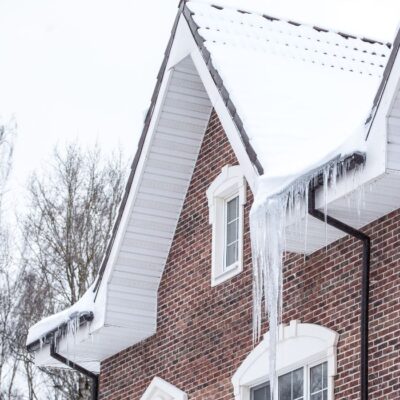Winterizing Your Home: How Spokane Homeowners Can Protect Their Property
As winter sets in across Spokane, homeowners face unique challenges when it comes to protecting their homes from the cold and snowy weather. With freezing temperatures, heavy snowfalls, and the occasional ice storm, it’s essential to ensure that your home is properly winterized to avoid costly repairs and potential damage. Fortunately, taking a few simple precautions can help protect your property from winter-related risks and ensure that you’re covered by the right home insurance. In this article, we’ll guide you through the best ways to winterize your home and discuss the importance of having adequate coverage in place this winter season.

1. Insulate Pipes to Prevent Freezing
Freezing pipes are a common winter problem, especially in areas like Spokane where temperatures can drop well below freezing. When water inside your pipes freezes, it expands, which can cause the pipes to burst, leading to expensive water damage and repairs.
Winterizing Tip: To prevent your pipes from freezing, make sure that they are properly insulated. Focus on pipes in unheated areas, such as basements, attics, and garages, as these are more prone to freezing. Use foam pipe insulation or even old towels to wrap exposed pipes. Additionally, allow faucets to drip slightly during extreme cold spells to keep water moving through the pipes.
Home Insurance Tip: While homeowners insurance generally covers damage from burst pipes, make sure your policy includes “frozen pipe” coverage. If you’re unsure, it’s worth reviewing your coverage with North Town Insurance to confirm that you’re protected from water damage caused by frozen pipes.
2. Check Your Roof for Snow Load
In Spokane, snow can accumulate quickly, and heavy snow buildup on your roof can cause significant damage if not properly managed. If the snow isn’t cleared off, it can lead to leaks, roof collapse, or damage to shingles.
Winterizing Tip: Regularly inspect your roof for signs of damage or wear, such as cracked shingles or loose flashing. If you notice any issues, repair them before the snow starts to fall. If possible, clear snow from your roof using a snow rake, particularly in areas where heavy snow accumulation is common. Avoid climbing on the roof yourself; consider hiring a professional to remove snow safely.
Home Insurance Tip: Make sure your home insurance policy includes coverage for snow damage. If your roof does collapse due to the weight of snow, your homeowners insurance should cover the repairs, provided that it’s not caused by neglect. North Town Insurance can help you assess your coverage to ensure you’re fully protected.
3. Seal Gaps and Cracks to Keep Heat In
The colder months often bring higher energy bills as homeowners rely on heating systems to keep their homes warm. However, drafts from poorly sealed doors, windows, or walls can significantly reduce your home’s energy efficiency, leading to higher heating costs.
Winterizing Tip: Check the seals around doors and windows for any gaps or cracks where cold air can seep in. Use weatherstripping, caulking, or foam sealant to seal these gaps and prevent warm air from escaping. Pay special attention to areas like the attic, basement, and any external walls, as these are common places for drafts to form.
Home Insurance Tip: While energy efficiency isn’t typically covered by insurance, maintaining your home’s integrity can reduce the risk of other issues, such as water damage from leaks or frozen pipes. With the right home maintenance, you can prevent costly insurance claims due to neglect.

4. Clean Gutters and Downspouts
Clogged gutters can cause serious damage to your home during winter. When gutters are blocked with leaves, debris, or ice, they can’t properly channel water away from your roof and foundation, leading to ice dams, leaks, and even foundation damage.
Winterizing Tip: Clean your gutters before the first snowfall to ensure they are free from debris. You should also make sure that downspouts direct water away from the foundation of your home to avoid flooding or water damage. Consider installing gutter guards to prevent debris buildup in the future.
Home Insurance Tip: Homeowners insurance typically covers water damage from gutters and downspouts if the damage is accidental or sudden, but neglecting maintenance could affect your claim. By regularly maintaining your gutters, you reduce the risk of preventable damage that may not be covered by insurance.
5. Maintain Heating Systems
A malfunctioning heating system can make life unbearable during the Spokane winter months. To avoid the inconvenience and cost of a heating system failure, it’s essential to have it inspected and serviced before the cold weather sets in.
Winterizing Tip: Hire a professional to inspect your furnace, heat pump, or boiler before the temperatures drop. Regular maintenance ensures that your heating system is working efficiently and can prevent breakdowns during the coldest days. Don’t forget to replace filters regularly and clean vents to improve airflow.
Home Insurance Tip: A properly maintained heating system can help prevent fire hazards or carbon monoxide leaks, which are serious risks in the winter. Make sure your homeowners insurance covers fire or damage caused by heating systems, and ask North Town Insurance about any additional coverage options for heating-related issues.
6. Protect Outdoor Equipment and Furniture
Outdoor furniture, grills, and equipment can be damaged by the elements during the winter months. Whether it’s a snowstorm or freezing temperatures, these items can be expensive to replace.
Winterizing Tip: Bring outdoor furniture, grills, and other equipment inside, or cover them with weather-resistant tarps to protect them from snow, ice, and freezing temperatures. If you have an irrigation system, make sure to drain it before the first freeze to prevent pipes from bursting.
Home Insurance Tip: Many homeowners policies cover personal property loss or damage, but it’s always good to confirm what’s included. If your outdoor equipment is expensive or valuable, you may want to add special coverage to your policy for added protection.
Why Winterizing Your Home Matters for Your Insurance
While taking these steps to winterize your home can prevent many common winter hazards, it’s equally important to ensure that your insurance coverage is up to date. Spokane’s winters can be harsh, and the damage caused by ice storms, snow, or frozen pipes can result in significant repair bills. By reviewing your home insurance policy and ensuring that you have the right coverage, you can have peace of mind knowing that your home is protected.
Protect Your Home with North Town Insurance
At North Town Insurance, we understand the unique risks that Spokane homeowners face during the winter months. Our experienced team is here to help you review your current policy, adjust your coverage, and ensure that your home is fully protected against winter-related damages. Whether you need assistance with home insurance, flood coverage, or special winter-related risks, we’re here to help.
Contact us today to schedule a policy review and get a quote. Winterize your home and protect it with the right insurance coverage from North Town Insurance.
Conclusion
Winterizing your home before the cold sets in is essential to avoid costly damage and ensure your home is safe during Spokane’s tough winter months. From insulating pipes to maintaining your heating system, these simple steps can protect your property and reduce the risk of insurance claims. At North Town Insurance, we’re here to help you prepare for winter with the right coverage so that you can enjoy peace of mind all season long. Get in touch with North Town Insurance today to review your home insurance policy and ensure you’re fully protected this winter season. Our team is ready to assist you with personalized coverage options tailored to your needs.
Read the December 2024 Edition of our Newsletter: Your Source for the Latest Insurance Industry Insights

Fine Print: This is a general overview with the intention of bringing awareness to coverage options and general industry standards. Coverage varies between carriers and states. Check your policy for specifics.
